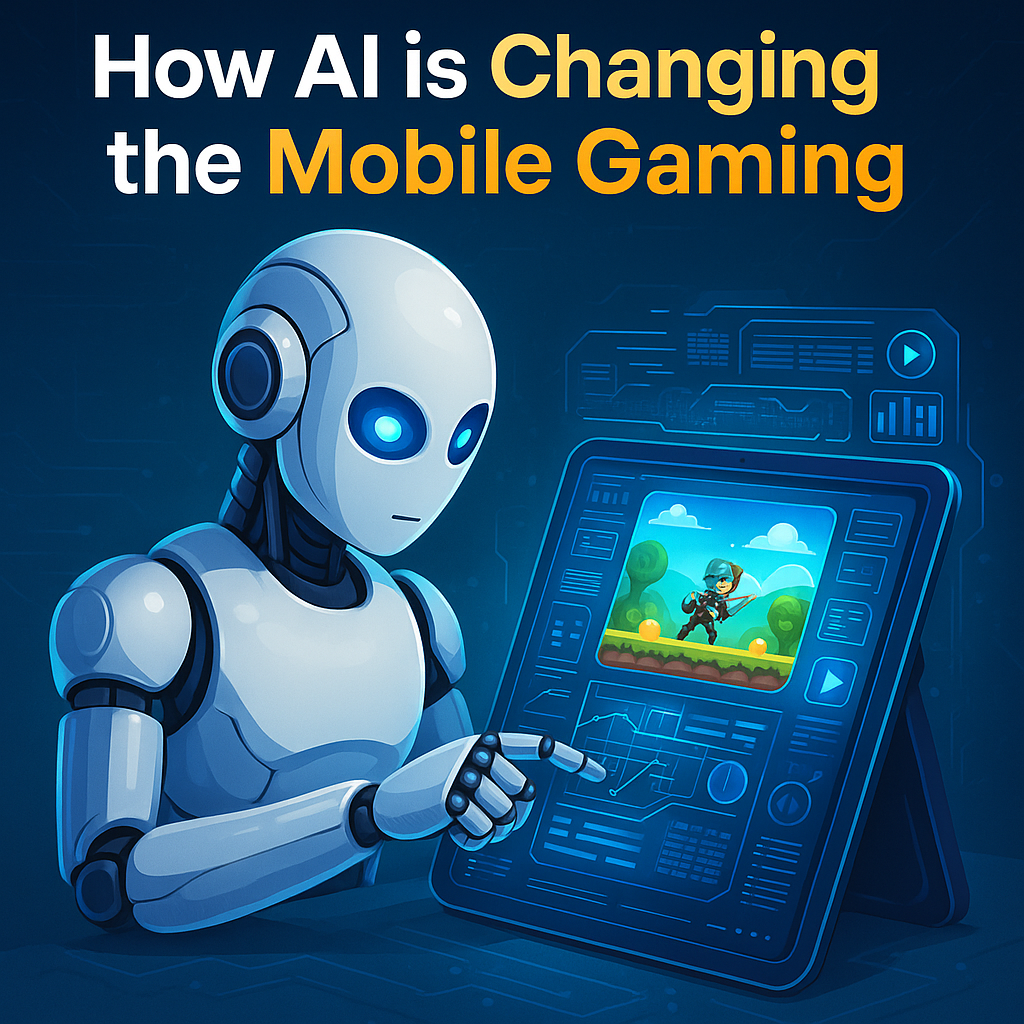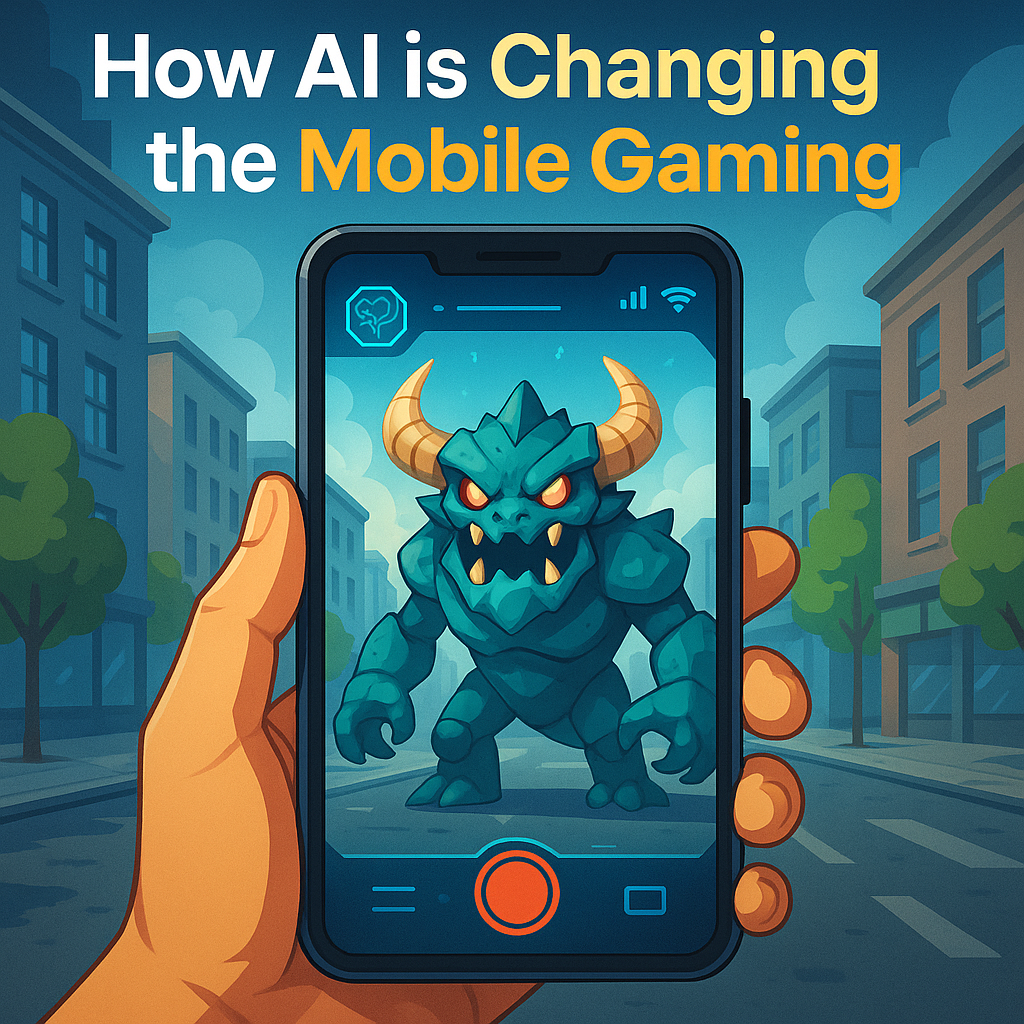
How AI is Changing the Mobile Gaming Industry in 2025
In 2025, artificial intelligence (AI) is at the center of a technological revolution in the mobile gaming sector. AI is changing how games are made, played, and made money, from personalized experiences to intelligent game design. AI has changed the game in every way, with the worldwide mobile gaming sector expected to generate over $150 billion in sales this year.
1. Smarter Non-Playable Characters (NPCs)
Gone are the days of predictable NPCs. AI-powered characters in 2025 now learn from player behavior, adapt strategies, and deliver dynamic challenges. These smarter NPCs make gameplay more engaging by mimicking human-like responses and decision-making.
Example:
Games like Arena Clash 2025 use reinforcement learning to make enemies evolve based on a player’s skills and tactics.
✅ Impact: AI NPCs improve immersion, reduce repetitiveness, and keep players hooked longer.
2. Personalized Gaming Experience
How AI is changing the mobile gaming world is evident in how it personalizes the gameplay for every user. AI algorithms analyze playing styles, time of activity, difficulty preference, and in-app behavior to tailor game missions, levels, and rewards accordingly.
Example:
Puzzle apps and RPGs adjust difficulty in real-time to challenge players just enough—not too easy or frustrating.
✅ Impact: Higher player retention, longer sessions, and better user satisfaction.
3. Predictive Analytics for Player Behavior
AI-driven analytics tools are being used to predict player churn, buying behavior, and playtime patterns. Game developers in 2025 use these insights to fine-tune their games for better engagement and monetization.
Example:
If the AI notices that a player is losing interest, it can trigger timely rewards or introduce new game features to bring them back.
✅ Impact: Improved in-app purchases, reduced user dropout rates, and better ad targeting.
4. AI-Powered Game Testing and Bug Detection
AI has revolutionized the way games are tested. Instead of relying solely on human QA testers, game studios now use AI bots to test games in thousands of scenarios. These bots can detect bugs, test edge cases, and simulate gameplay at scale.
Example:
AI in DevSim Mobile can complete a level 1000 times in minutes to analyze stability, performance, and UX flaws.
✅ Impact: Faster release cycles, fewer bugs, and better user experience from day one.
5. Voice and Gesture Recognition in Gaming
With the integration of AI in voice recognition and motion tracking, mobile games in 2025 offer more intuitive control systems. Players can issue commands, interact with virtual characters, or perform tasks using their voice or gestures—thanks to AI models trained on massive datasets.
Example:
Fitness games now use AI-powered camera input to track body movement and score in real-time, similar to a virtual coach.
✅ Impact: Enhanced interactivity, accessibility for differently-abled gamers, and deeper immersion.

6. Real-Time Game World Evolution
Games powered by AI can now generate environments, characters, and quests on the fly. This type of procedural generation ensures no two players have the same journey. In 2025, many open-world mobile games use AI to create ever-changing landscapes and missions.
Example:
Frontier Planet uses AI to build unique in-game ecosystems that evolve with the player’s actions and decisions.
✅ Impact: Infinite replayability, richer storytelling, and expansive game worlds with smaller teams.
7. AI in AR and VR Mobile Games
Artificial intelligence is merging seamlessly with augmented reality (AR) and virtual reality (VR) mobile games in 2025. AI helps these games understand real-world environments, place objects accurately, and enable lifelike NPC interaction in AR spaces.
Example:
In AR Quest Chronicles, AI scans the user’s surroundings and generates quests that match real-world locations—offering a Pokémon Go-like experience, but more intelligent and adaptive.
✅ Impact: Blended physical-digital experiences, more accurate object recognition, and location-based storytelling.
8. AI-Assisted Game Development
AI tools now assist developers by generating code, creating character animations, and even designing game levels based on minimal input. This reduces development time and allows indie developers to create high-quality games without massive budgets.
Example:
AI tools like Unity’s ML-Agents or Google’s GameGAN are being used to build levels, balance economies, and model player behavior before launch.
✅ Impact: Lower development costs, more innovative indie titles, and faster time to market.
9. Enhanced Anti-Cheat Mechanisms
In multiplayer games, AI is now used to detect and prevent cheating in real-time. It monitors gameplay patterns and flags anomalies instantly, ensuring fair play for everyone.
Example:
Battle royale games in 2025 use neural networks trained on normal gameplay to spot bots, aimbots, and modded clients within seconds.
✅ Impact: Better community trust, fairer rankings, and less manual moderation required.
10. Emotional AI in Gaming
One of the most futuristic applications of AI in mobile gaming is emotional AI. These systems detect user emotions through facial recognition, tone analysis, or gameplay behavior. Games can then respond accordingly—making the player feel more understood and connected.
Example:
If a player is stressed, a calming background theme is introduced or gameplay slows down to ease the experience.
✅ Impact: More empathetic games, adaptive difficulty, and improved mental wellness in gameplay.
🔥 Related Posts

HoodaMath.com Online Learning Games 2026: Still Free, Fun & Unblocked? Top Picks & Guide

Top 5 Mobile Games with the Best Graphics (Console-Level)

Game for Peace: The Ultimate Battle Royale Experience for Gamers in the U.S.

Most Played Mobile Games of All Time – A Global Overview

Minecraft Education Edition — The Complete Teacher & IT Guide
